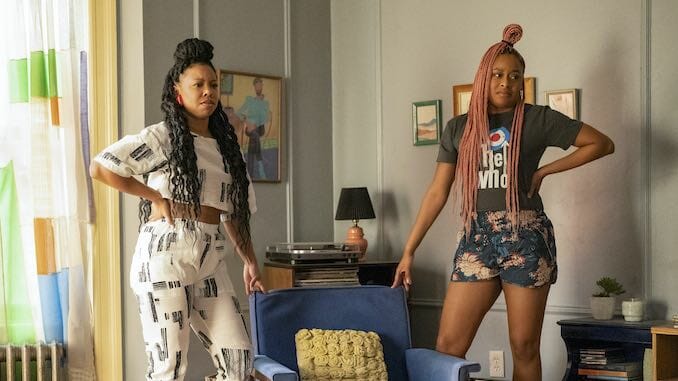Everything’s Trash: Phoebe Robinson’s Freeform Series Thinks It’s Saying More Than It Is
Photo Courtesy of Freeform
The new Freeform comedy Everything’s Trash leans on the signature style of comedian Phoebe Robinson. For the uninitiated, that means it’s unfiltered, straight to the point, and full of messy, raw details told through Internet slang—and her line delivery has a sing-song quality to it. It makes sense that the series shares DNA with Robinson’s stylings since it was adapted from and inspired by her 2018 comedic collection of the same name that features approachable essays about modern dating, racism, and feminism.
Formerly of the comedic duo “2 Dope Queens” with Jessica Williams, Robinson hosts a podcast in real life and is a three-time author, and essentially lifts her public persona for the main character of the series. But the show—which follows a foul-mouthed and envelope-pushing podcaster Phoebe Hill (Robinson) who starts to get her act together when her brother runs for local office—unfortunately thinks it’s saying more than it actually is.
The four episodes (of eleven) available to critics were uneven in execution. In one, Phoebe’s podcast is heralded as a mix between highbrow and lowbrow culture—enough to get her a gig speaking at a college—but we don’t really get to see the highbrow moments in the short snippets of the podcast. We mostly only hear her talk about her sexual exploits, which are hilarious, but not necessarily groundbreaking content. More positively, another episode has Phoebe facing her mounting credit card debt head-on when she coordinates a stylish magazine cover photo shoot for herself, which eventually yields to a really good conversation about social media perception vs. reality.
One of the pitfalls of the series is that we hardly see Phoebe really start her “forced journey into maturity” as the logline promises—at least not in these opening episodes. Phoebe’s main character trait is that she’s an open book, especially when it comes to sex. It’s a great subject for the podcast, but also makes her somewhat of a one-note and occasionally selfish character here. In the pilot, Phoebe accidentally sleeps with the Communications Director of her brother’s opponent and has to deal with the fallout… except that fallout never really comes. The show leans more into Phoebe addressing the person who posted a picture of their makeout rather than the morality of the relationship, which would have made for a more interesting arc. And it shows that she hasn’t really committed to changing; Phoebe knowingly sleeps with him again. Even though we don’t expect her to change overnight, the show brushes over her internal dilemma without much of a thought.
-

-

-

-

-

-

-

-

-

-

-

-

-

-

-

-

-

-

-

-

-

-

-

-

-

-

-

-

-

-

-

-

-

-

-

-

-

-

-

-








































